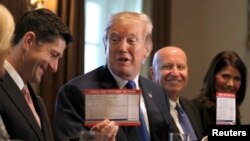U.S. religious entities would be allowed to engage in political activity without the risk of losing their tax-exempt status under a Republican proposal to overhaul the tax code unveiled on Thursday, a move that could give influential community leaders more latitude to try to influence voters.
The plan would eliminate a provision in the tax code known as the "Johnson Amendment," which prohibits churches from using church resources to encourage voting for or against a candidate.
A religious leader can currently endorse a candidate in their personal capacity, but they cannot do so within the confines of their church, mosque or synagogue or use their staff to help a candidate.
Supporters say it will increase religious liberty. Opponents say it will allow political leaders to pressure churches and allow some churches to be turned into political operations.
The change would apply to all religious groups that register as nonprofits, including places of worship for Christians, Muslims and Jews.
But it is evangelical Christians — who have become increasingly more engaged in the political process in the past 25 years — who have clamored the most loudly for the change.
President Donald Trump, who is popular with evangelical voters, vowed on the campaign trail to scrap the Johnson Amendment, arguing that it kept evangelical churches from helping his campaign.
Critics of the Johnson Amendment have long argued that it violates the First Amendment's separation of church and state because it imposes restrictions on what religious leaders can say. But supporters of the Johnson Amendment say it does just the opposite and instead protects the separation of church and state, arguing that it will allow political leaders to pressure churches to give them endorsements.
The announced change was part of a proposed cut in the corporate tax rate to 20 percent from 35 percent, which is the centerpiece of the tax proposal unveiled by House of Representatives Republicans. The plan would also reduce tax rates on some individuals and families.
Many analysts have raised doubts about the likelihood that Congress will be able to pass a comprehensive tax package, including whether they will have enough support for several provisions including the change in religious rules.
Allowing churches to engage in political activity might provide some tactical help for Republicans in the 2018 U.S. congressional elections.
Republicans have long argued that the Johnson Amendment places them at a disadvantage because churches are a central organizing mechanism for their voters while labor unions, which favor Democrats, are allowed to engage in political activity and operate as tax-exempt.





